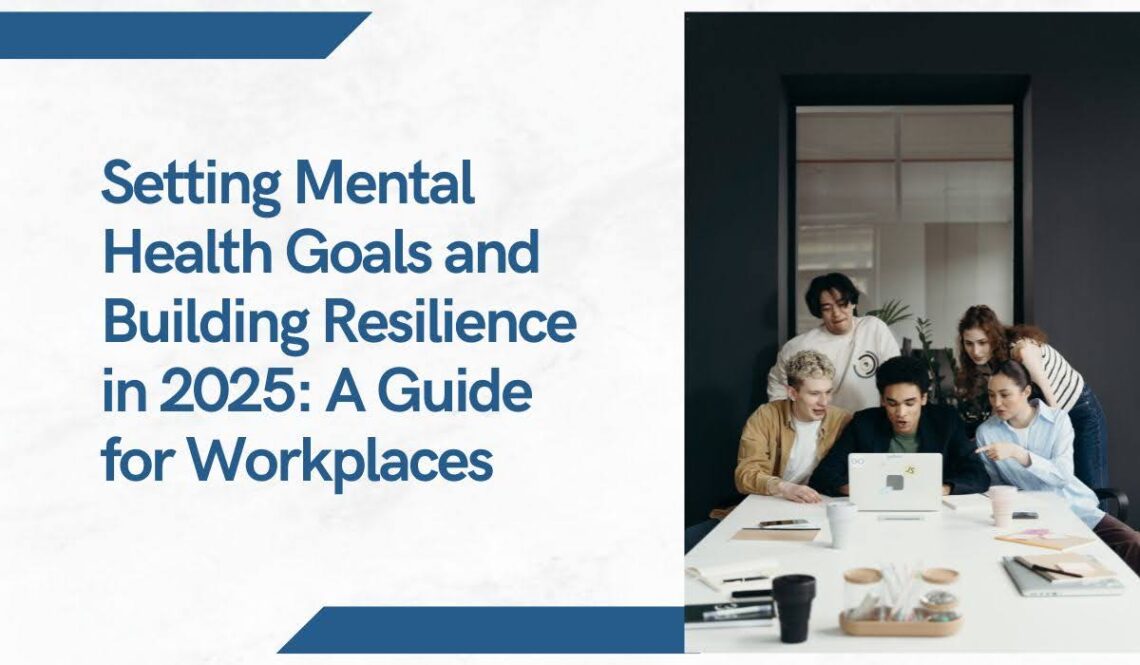
Setting Mental Health Goals and Building Resilience in 2025: A Guide for Workplaces
As we welcome a new year, it’s the perfect time for workplaces to reflect on past challenges and set a clear direction for fostering mental health and resilience. With mental health concerns steadily rising, organisations play a crucial role in supporting employees and cultivating environments where wellbeing is a priority. Combining proactive goal-setting with practical strategies for resilience can pave the way for a more successful and balanced year ahead.
Why Mental Health Goals Matter for Workplaces
Setting mental health goals isn’t just about ticking a box; it’s about fostering a supportive and thriving workplace culture. Mental health challenges cost businesses billions annually in lost productivity, absenteeism, and turnover. By setting clear, actionable mental health goals, organisations can create an environment where employees feel valued, supported, and equipped to navigate challenges.
Practical Tips for Setting Mental Health Goals
- Identify Specific Objectives:
Define clear, measurable goals that align with your organisation’s values. For example:- Reduce workplace stress by implementing flexible working hours.
- Provide quarterly mental health training sessions.
- Create a peer support network to encourage open dialogue.
- Involve Employees:
Ask your team what they need to feel supported. Surveys, anonymous feedback, and one-on-one discussions can reveal key areas for improvement. - Integrate Wellbeing into Policies:
Make mental health an integral part of your organisational culture. This includes offering paid mental health days, ensuring workloads are manageable, and prioritising work-life balance. - Provide Resources and Training:
Equip your team with tools to recognise, address, and manage mental health challenges. Courses like Mental Health First Aid or resilience workshops can make a tangible difference.
Building Resilience for a Thriving 2025
Resilience—the ability to bounce back from challenges and adapt to change—is vital for both employees and organisations. The unpredictable nature of modern work environments, coupled with global uncertainties, makes resilience a cornerstone of success.
Key Strategies to Foster Resilience in the Workplace
- Promote Emotional Awareness:
Encourage employees to recognise and process their emotions. Mindfulness sessions, journaling workshops, or access to counselling services can help. - Strengthen Support Systems:
Cultivate a sense of community within the workplace. Team-building activities, mentorship programs, and regular check-ins help foster connections. - Encourage Growth Mindsets:
Resilience thrives when employees see challenges as opportunities for growth. Provide professional development opportunities and celebrate efforts, not just outcomes. - Focus on Physical Wellbeing:
Physical health and mental health go hand in hand. Offer initiatives like fitness classes, healthy snacks, or walking meetings to promote overall wellbeing. - Address Burnout Proactively:
Signs of burnout include exhaustion, disengagement, and reduced productivity. Train managers to identify these signs early and create actionable plans to support affected employees.
Case Study: Success Through Mental Health Goals and Resilience Building
A tech company implemented monthly resilience workshops and introduced flexible working hours to address stress and improve mental health. Within a year, the company saw a 25% reduction in sick days and reported higher employee satisfaction scores. This highlights how combining structured mental health goals with resilience strategies can drive tangible outcomes.
Creating a Resilient and Supportive Workplace Culture in 2025
To make a lasting impact, organisations must go beyond one-off initiatives. Here are some long-term approaches to consider:
- Invest in Leadership Training: Leaders set the tone for workplace culture. Equip them with skills to recognise mental health challenges and support employees effectively.
- Normalise Mental Health Conversations: Break the stigma by making mental health discussions a regular part of workplace communication.
- Celebrate Successes: Recognise and reward efforts toward mental health and resilience goals. Celebrate milestones, whether it’s completing a training program or improving team engagement scores.
Looking Ahead
Setting mental health goals and building resilience isn’t just a responsibility; it’s an investment in your organisation’s future. As we step into 2025, workplaces have a unique opportunity to lead the way in mental health innovation, ensuring their teams are equipped to thrive in the face of challenges.
By taking intentional steps to support employee wellbeing, organisations can foster a culture of care, resilience, and productivity—one that benefits employees and the bottom line alike. Let’s make 2025 the year of thriving, not just surviving






